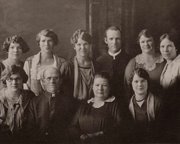Kurdish president Massoud Barzani: a strongly unified Iraq is "bird dreams and wishes"
An article by Sam Dagher published May 2, 2010 in the New York Times online site relates that, emboldened by his party's electoral success, Massoud Barzani, the president of Iraq's semiautonomous Kurdistan region, is intensifying his demands for greater sovereignty and control of oil.
His demands for a federalist approach to governing Iraq -- a weakened national government and stronger regional control -- have revived fears that his Iraqi Kurdistan region may eventually try to secede.
The March 7 elections solidified Mr. Barzani's position as the dominant voice in Kurdish politics, with his Kurdistan Democratic Party winning 29 of the Kurds' 57 seats in parliament.
Evidence of Kurdish assertiveness came last week when the Kurdistan Regional Parliament quietly created a new committee tasked with reclaiming "historic Kurdish land" -- meaning contested areas like Kirkuk and hot spots in Nineveh Province -- under the regional government's de facto control but nominally still attached to the central government.
During a recent interview, Mr. Barzani stressed that he believed that the only hope left for stability in Iraq was in dividing it into federations, preferably three: Kurds in the north, Sunni Arabs in the middle and west and Shiites in the south. He likened talk of a strongly unified Iraq to "bird dreams and wishes."
With no clear winner emerging in the Iraq national elections of March 7th, the Sunnis and Shiites will need to look to the Kurds to form a majority government. But Mr. Barzani said he was determined to extract upfront commitments for any prospective coalition partners in Baghdad on potentially explosive issues like the settlement of disputed internal borders, including those of the oil-rich northern city of Kirkuk, and the sharing of oil revenues.
One of the crucial Kurdish demands will be a pledge from the next prime minister to carry out Article 140 of the Constitution, a hotly contested passage that outlines the steps toward a referendum on the fate of the disputed northern territories, including Kirkuk.
"If Article 140 is not implemented, then this will mean the demise of the Constitution and Iraq itself," Mr. Barzani warned. But a senior American diplomat in Baghdad, speaking on the condition of anonymity, was hesitant to support such a vote: "The Balkans, when they tried an up or down referendum, it led to bloodshed."
And so Jeremiah's prophecy of the clash between the Medes and the Chaldeans, the Kurds and the Iraqis, seems to be imminent.
An article by Sam Dagher published May 2, 2010 in the New York Times online site relates that, emboldened by his party's electoral success, Massoud Barzani, the president of Iraq's semiautonomous Kurdistan region, is intensifying his demands for greater sovereignty and control of oil.
His demands for a federalist approach to governing Iraq -- a weakened national government and stronger regional control -- have revived fears that his Iraqi Kurdistan region may eventually try to secede.
The March 7 elections solidified Mr. Barzani's position as the dominant voice in Kurdish politics, with his Kurdistan Democratic Party winning 29 of the Kurds' 57 seats in parliament.
Evidence of Kurdish assertiveness came last week when the Kurdistan Regional Parliament quietly created a new committee tasked with reclaiming "historic Kurdish land" -- meaning contested areas like Kirkuk and hot spots in Nineveh Province -- under the regional government's de facto control but nominally still attached to the central government.
During a recent interview, Mr. Barzani stressed that he believed that the only hope left for stability in Iraq was in dividing it into federations, preferably three: Kurds in the north, Sunni Arabs in the middle and west and Shiites in the south. He likened talk of a strongly unified Iraq to "bird dreams and wishes."
With no clear winner emerging in the Iraq national elections of March 7th, the Sunnis and Shiites will need to look to the Kurds to form a majority government. But Mr. Barzani said he was determined to extract upfront commitments for any prospective coalition partners in Baghdad on potentially explosive issues like the settlement of disputed internal borders, including those of the oil-rich northern city of Kirkuk, and the sharing of oil revenues.
One of the crucial Kurdish demands will be a pledge from the next prime minister to carry out Article 140 of the Constitution, a hotly contested passage that outlines the steps toward a referendum on the fate of the disputed northern territories, including Kirkuk.
"If Article 140 is not implemented, then this will mean the demise of the Constitution and Iraq itself," Mr. Barzani warned. But a senior American diplomat in Baghdad, speaking on the condition of anonymity, was hesitant to support such a vote: "The Balkans, when they tried an up or down referendum, it led to bloodshed."
And so Jeremiah's prophecy of the clash between the Medes and the Chaldeans, the Kurds and the Iraqis, seems to be imminent.
Labels: Judgment 6 - Civil War, Kings of the Medes



0 Comments:
Post a Comment
Subscribe to Post Comments [Atom]
<< Home